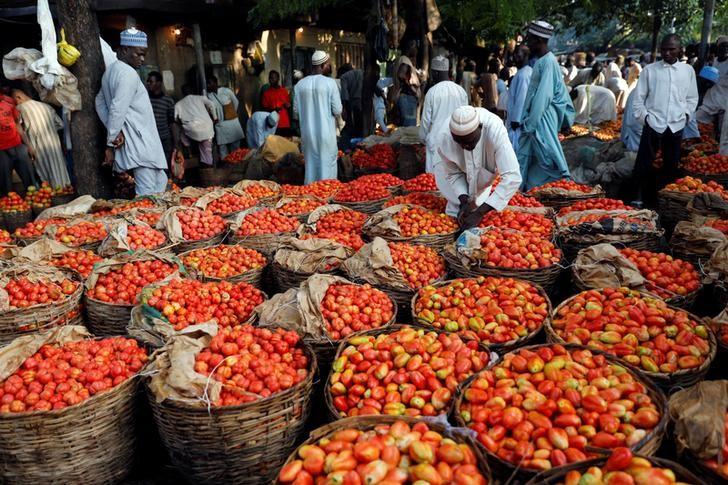
People walk past baskets of tomatoes in the Yankaba market in Kano, northwest Nigeria August 23, 2017. REUTERS/Akintunde Akinleye
Nigeria’s National Bureau of Statistics (NBS), on Tuesday, published the country’s inflation data, showing that Consumer Price Index rose for the 15th consecutive month to 14.89% (year-on-year) at the end of November 2020, its highest since January 2018, from 14.23% in October.
Inflation continues to be driven by soaring food prices, due to the twin evils of the continued border closure and the heightening spate of insecurity in the country propelled by the Boko Haram insurgency in the country’s North East and banditry in the western flank.
Recall that over 100 rice farmers were killed in their farms in Borno State by Boko Haram members, just as farmers in the North-West have been attacked and killed also by cattle rustlers, even as herders continue to lose their farms and even lives to herders in other parts of the country.
Consequently, there is palpable fear of an impending food crisis in the country, even as President Muhammadu Buhari recently promised to reopen the country’s land borders soon.
Food inflation surged 18.3%, the highest in over three years, from 17.38% YoY in October, and 2.04%, MoM from 1.96% in the previous month, with the highest increases seen in the prices of oil and fat, fish, potatoes, y am and other tubers, fruits, meat, vegetables, bread and cereals.
Core sub-index in November climbed 11.05%, down from 11.14%; just as it dropped from 1.25% MoM to 0.71%, driven by passenger transport by air, medical services, maintenance and repair of personal transport equipment, pharmaceutical products, as well as hairdressing salons and personal grooming establishments; hospital services, vehicle spare parts, passenger transport by road, paramedical services, repair of furniture, motor cars.
Urban inflation rate climbed 15.47% up YoY from 14.81% in the prior month, while rural inflation rate increased by 14.33% in the month under review, from 13.68%.
The corresponding 12-month year-on-year average percentage change for the urban index stood at 13.65% in November 2020, higher than 13.29% reported in October 2020; while the corresponding rural inflation rate in November 2020 increased to 12.35%, compared to 12.09% recorded in October 2020.
On a state-by-state basis, inflation was highest during the month on year on year basis in Kogi at 19.81%; Bauchi, where it stood at 19.67%; and Zamfara, 17.30%; while Kwara recorded 12.24%, the slowest rise within the period; Delta, 13.20%; and Abia, 13.26%.
On month on month basis however, November 2020 all items inflation was highest in Kogi, 3.08%; followed by Bauchi and Oyo with 2.33% and 2.25%, respectively; just as Nasarawa with 0.44%, recorded the slowest rise in headline month on month inflation; ahead of Akwa Ibom, 0.77%; and Rivers, 0.88%.
In analysing price movements under this section, the bureau noted “that the CPI is weighted by consumptionexpenditure patterns which differ across states. Accordingly, the weight assigned to a particular food or non-food item may differ from state to state making interstate comparisons of consumption basket inadvisable and potentially misleading.”
In the month under review also, at 24%, food inflation on a year on year basis was highest in Kogi; Sokoto and Zamfara, 20.6%; and Ebonyi, 20.20%; while Gombe and Nasarawa recorded 15.00%, the slowest rise; Bauchi, 15.60%; Abia, 16.20%.
On month on month basis however, November 2020 food inflation was highest in Kogi, 3.37%; Osun, 3.08%; and Cross River, 2.93%; while Akwa Ibom recorded 0.60% growth MoM, ahead of Edo, 0.43%; with Nasarawa recording price deflation or negative inflation (general decrease in the general price level of food or a negative food inflation rate.












